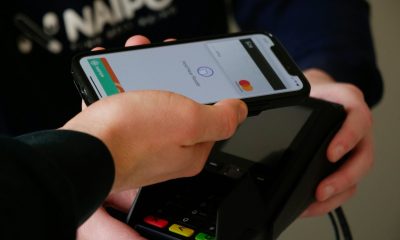Featured
How mobile money is disrupting banking in Argentina
Migrant workers all across the world send billions of dollars back home to their families every year and Argentina is no different. Remittances in the country are rapidly increasing and a part of a Laitn American market that the World Bank estimates is worth more than $137 billion. Companies in the region aim to process $5 billion in remittances by 2025.

According to official data, XCOOP has proposed the digital transformation of remittances with a special focus on financial inclusion in Argentina. This is part of a growing phenomenon of fintech adoption in Latin America generally and could help to significantly streamline the regions financial processes.
Get comprehensive access to global fintech, business, stock market, finance news, and trending topics like Bitcoin and cryptocurrency with the Born2Invest companion app.
Sending money to family is the most important reason to use fintech
Every time people go to the bank to send/receive money to or from another country they are taking part in a massive international system. According to official data, Argentina and Spain are among the main destinations for family remittances. Day-to-day transactions are usually made with Paraguay, Bolivia, Peru, Colombia and, due to the recent crisis, Venezuela.
The traditional model was to take cash in person and pay a commission (around 15%) to make the shipment. The technology that began to transform this model in the United States, Europe, and Asia is gaining ground in Latin America. “Just as the world evolved, we have to evolve,” explained Alex Torriglia, one of XCOOP’s founders and Chief Operating Officer.
Based in Argentina, fintech has sparked a digital transformation of remittance sending with a special focus on financial inclusion. “So far the relationship ends when the user receives the money, but this was not included in the banking system or in any payment system,” Alex Torriglia said during the presentation.
It should be noted that 90% of those who receive family remittances are located at the bottom of the social pyramid and spend the money mainly on food, health, clothing, and education. Carrying out the transaction from a cell phone could represent a simpler and less costly solution. The commercial ecosystem of the remittance could go down to zero, covered by the different commissions generated by the use of money in the system.
Cooperative network of financial institutions
“If a person lives here and needs to send money to his relatives in Paraguay to pay for electricity, why does he have to pay 15% commission if he can use the internet to pay for electricity from Argentina,” asked Torriglia. For that, XCOOP closed agreements with the service companies of each country, while creating alliances to be able to recharge cell phone credit from the platform.
The idea is for people to voluntarily join a regional cooperative network of financial institutions, technology providers, retailers, and businesses. For this reason, the financial inclusion process contemplated an agreement with the largest payment services company in Argentina: in these stores, it will be possible to send cash-to-cash and then accompany the users on their way to adapt to new tools such as card-to-card or mobile wallets.
“It’s a step by step journey. Then we will be able to offer them other financial services such as rechargeable cards, and qualify them to grant them microcredits or advances on remittances,” he said.
After that point, once the remittance is being operated in the commercial ecosystem, the cost of sending could go down to zero, covered by the different commissions generated by the use of that money in the system.
The tip of a giant iceberg
Historically, Argentina is a country that is more a sender of remittances than a receiver, although the amounts of that balance were modified to the rhythm of the economic crisis of the last two years. People usually send money to Spain, more than $900 million per year. That can be explained in great part by the contributions of the middle and upper classes to relatives who study or work there.
Most of the remittance money goes to Paraguay, Bolivia, Peru, Colombia and, as a result of the serious situation, it is going through, Venezuela. With the exception of Spain, most of them are unbanked.
New global destinations
Globally, remittances accumulate more than $610 billion, with an informal cost estimated at an additional $300 billion. There are entire economic systems, as in Nicaragua, where they represent 85% of capital income. Mexico, the great Latin American recipient, is accumulating $30,000 million a year.
Taking into account that for the World Bank the potential market in Latin America is $137 billion, the rate of growth of the sector worldwide is 6 to 8% per year. In developed countries, money transfer companies won between 30 to 40% to traditional companies, for Torriglia the scenario “has opened a great opportunity. Our model is much simpler and more agile than the traditional one, which needs intermediaries, offices and rate agents in a process with too many actors in the environment, which makes the cost of shipping more expensive and extremely complex”.
After an initial investment of $5 million and two years of internal development, XCOOP’s roadmap is to have the Argentina – Paraguay route operational for Christmas and add the different destinations, as the regulatory aspects are completed in each country, from the first quarter of 2020. The goal is to reach 5 million users and $5 billion in remittances by 2025.
__
(Featured image by Luis Villasmil via Unsplash)
DISCLAIMER: This article was written by a third party contributor and does not reflect the opinion of Born2Invest, its management, staff or its associates. Please review our disclaimer for more information.
This article may include forward-looking statements. These forward-looking statements generally are identified by the words “believe,” “project,” “estimate,” “become,” “plan,” “will,” and similar expressions. These forward-looking statements involve known and unknown risks as well as uncertainties, including those discussed in the following cautionary statements and elsewhere in this article and on this site. Although the Company may believe that its expectations are based on reasonable assumptions, the actual results that the Company may achieve may differ materially from any forward-looking statements, which reflect the opinions of the management of the Company only as of the date hereof. Additionally, please make sure to read these important disclosures.
First published in NOTICIAS&PROtagonistas, a third-party contributor translated and adapted the article from the original. In case of discrepancy, the original will prevail.
Although we made reasonable efforts to provide accurate translations, some parts may be incorrect. Born2Invest assumes no responsibility for errors, omissions or ambiguities in the translations provided on this website. Any person or entity relying on translated content does so at their own risk. Born2Invest is not responsible for losses caused by such reliance on the accuracy or reliability of translated information. If you wish to report an error or inaccuracy in the translation, we encourage you to contact us.

-

 Biotech4 days ago
Biotech4 days agoAdvancing Sarcoma Treatment: CAR-T Cell Therapy Offers Hope for Rare Tumors
-

 Impact Investing2 weeks ago
Impact Investing2 weeks agoShein Fined €40 Million in France for Misleading Discounts and False Environmental Claims
-

 Impact Investing1 day ago
Impact Investing1 day agoNidec Conversion Unveils 2025–2028 ESG Plan to Drive Sustainable Transformation
-

 Impact Investing1 week ago
Impact Investing1 week agoVernazza Autogru Secures €5M Green Loan to Drive Sustainable Innovation in Heavy Transport

























